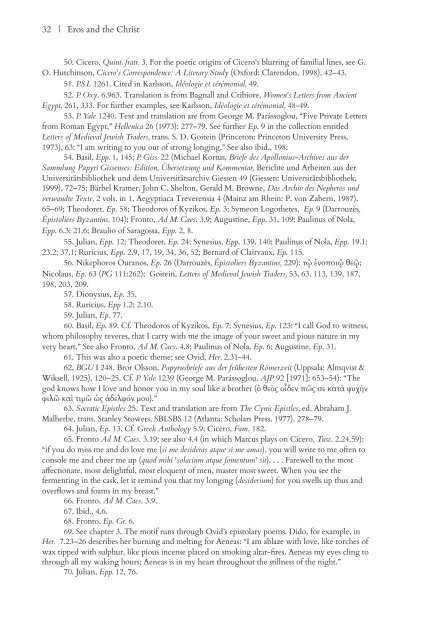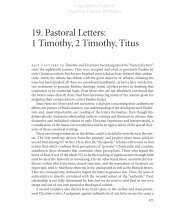Chapter 1 - Augsburg Fortress
Chapter 1 - Augsburg Fortress
Chapter 1 - Augsburg Fortress
Create successful ePaper yourself
Turn your PDF publications into a flip-book with our unique Google optimized e-Paper software.
32 | Eros and the Christ<br />
50. Cicero, Quint. fratr. 3. For the poetic origins of Cicero's blurring of familial lines, see G.<br />
O. Hutchinson, Cicero's Correspondence: A Literary Study (Oxford: Clarendon, 1998), 42–43.<br />
51. P.S.I. 1261. Cited in Karlsson, Idéologie et cérémonial, 49.<br />
52. P. Oxy. 6.963. Translation is from Bagnall and Cribiore, Women's Letters from Ancient<br />
Egypt, 261, 333. For further examples, see Karlsson, Idéologie et cérémonial, 48-49.<br />
53. P. Yale 1240. Text and translation are from George M. Parássoglou, “Five Private Letters<br />
from Roman Egypt,” Hellenica 26 (1973): 277–79. See further Ep. 9 in the collection entitled<br />
Letters of Medieval Jewish Traders, trans. S. D. Goitein (Princeton: Princeton University Press,<br />
1973), 63: “I am writing to you out of strong longing.” See also ibid., 198.<br />
54. Basil, Epp. 1, 145; P. Giss. 22 (Michael Kortus, Briefe des Apollonius-Archives aus der<br />
Sammlung Papyri Gissenses: Edition, Übersetzung und Kommentar, Berichte und Arbeiten aus der<br />
Universitätsbibliothek und dem Universitätsarchiv Giessen 49 (Giessen: Universitätsbibliothek,<br />
1999), 72–75; Bärbel Kramer, John C. Shelton, Gerald M. Browne, Das Archiv des Nepheros und<br />
verwandte Texte, 2 vols. in 1, Aegyptiaca Treverensia 4 (Mainz am Rhein: P. von Zabern, 1987),<br />
65–69; Theodoret, Ep. 58; Theodoros of Kyzikos, Ep. 3; Symeon Logothetes, Ep. 9 (Darrouzès,<br />
Épistoliers Byzantins, 104); Fronto, Ad M. Caes. 3.9; Augustine, Epp. 31, 109; Paulinus of Nola,<br />
Epp. 6.3; 21.6; Braulio of Saragossa, Epp. 2, 8.<br />
55. Julian, Epp. 12; Theodoret, Ep. 24; Synesius, Epp. 139, 140; Paulinus of Nola, Epp. 19.1;<br />
23.2; 37.1; Ruricius, Epp. 2.9, 17, 19, 34, 36, 52; Bernard of Clairvaux, Ep. 115.<br />
56. Nikephoros Ouranos, Ep. 26 (Darrouzès, Épistoliers Byzantins, 229): τῷ ἐνοποιῷ θεῷ;<br />
Nicolaus, Ep. 63 (PG 111:262); Goitein, Letters of Medieval Jewish Traders, 53, 63, 113, 139, 187,<br />
198, 203, 209.<br />
57. Dionysius, Ep. 35.<br />
58. Ruricius, Epp 1.2; 2.10.<br />
59. Julian, Ep. 77.<br />
60. Basil, Ep. 89. Cf. Theodoros of Kyzikos, Ep. 7; Synesius, Ep. 123: “I call God to witness,<br />
whom philosophy reveres, that I carry with me the image of your sweet and pious nature in my<br />
very heart.” See also Fronto, Ad M. Caes. 4.8; Paulinus of Nola, Ep. 6; Augustine, Ep. 31.<br />
61. This was also a poetic theme; see Ovid, Her. 2.31-44.<br />
62. BGU I 248. Bror Olsson, Papyrusbriefe aus der frühesten Römerzeit (Uppsala: Almqvist &<br />
Wiksell, 1925), 120–25. Cf. P. Yale 1239 (George M. Parássoglou, AJP 92 [1971]: 653–54): “The<br />
god knows how I love and honor you in my soul like a brother (ὁ θεὸς οἶδεν πῶς σε κατὰ ψυχὴν<br />
φιλῶ καὶ τιμῶ ὡς ἀδελφόν μου).”<br />
63. Socratic Epistles 25. Text and translation are from The Cynic Epistles, ed. Abraham J.<br />
Malherbe, trans. Stanley Stowers, SBLSBS 12 (Atlanta: Scholars Press, 1977), 278–79.<br />
64. Julian, Ep. 13. Cf. Greek Anthology 5.9; Cicero, Fam. 182.<br />
65. Fronto Ad M. Caes. 3.19; see also 4.4 (in which Marcus plays on Cicero, Tusc. 2.24.59):<br />
“if you do miss me and do love me (si me desideras atque si me amas), you will write to me often to<br />
console me and cheer me up (quod mihi 'solacium atque fomentum' sit). . . . Farewell to the most<br />
affectionate, most delightful, most eloquent of men, master most sweet. When you see the<br />
fermenting in the cask, let it remind you that my longing (desiderium) for you swells up thus and<br />
overflows and foams in my breast.”<br />
66. Fronto, Ad M. Caes. 3.9.<br />
67. Ibid., 4.6.<br />
68. Fronto, Ep. Gr. 6.<br />
69. See chapter 3. The motif runs through Ovid’s epistolary poems. Dido, for example, in<br />
Her. 7.23–26 describes her burning and melting for Aeneas: “I am ablaze with love, like torches of<br />
wax tipped with sulphur, like pious incense placed on smoking altar-fires. Aeneas my eyes cling to<br />
through all my waking hours; Aeneas is in my heart throughout the stillness of the night.”<br />
70. Julian, Epp. 12, 76.




